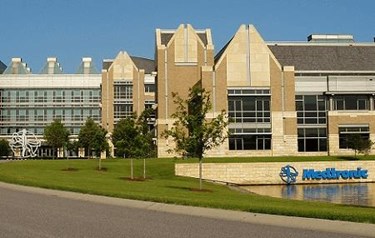Medtronic CEO Reports "Solid" Revenue Rebound, Remains Mum On Medical Supplies Business Sale

Medtronic beat estimates this week with “solid” performance in all of its businesses and markets, said CEO Omar Ishrak, which puts the company back on track after reported Q2 slowdown last year. Ishrak declined to comment on recent rumors that Medtronic is looking to sell its medical supply business, acquired through its purchase of Covidien in 2015.
Despite “disappointing” Q2 numbers announced in November, Ishrak said that he expected a quick rebound once promising products in the company’s pipeline were introduced, including the Evolut R XL transcatheter aortic valve replacement and the MiniMed 670G “artificial pancreas” system. The latter is slated for release early in 2017, and the CEO expects both products to drive double-digit growth in the back half of the fiscal year.
In the past three months, Medtronic’s revenue has grown by 5 percent, compared to the same earnings period last year, to $7.28 billion, with net profits of $821 million, according to a press release. U.S. and Non-U.S. markets grew four and six percent respectively, but the largest momentum was achieved in emerging markets, which represented 14 percent of Medtronic’s overall business and grew by 11 percent. All of Medtronic’s business segments — including its Cardiac and Vascular Group (CVG), Minimally Invasive Therapies (MITG), Restorative Therapies, and Diabetes — grew between four and six percent.
“In Q3, we achieved solid results across all of our business groups and geographies,” said Ishrak in a press release, highlighting the synergy of programs integrated as a result of the Covidien acquisition. In an earnings call, Ishrak referred to the company’s “crisp execution” of three growth strategies: therapy innovation, globalization, and economic value.
“Our product pipeline remains robust across all of our groups,” said Ishrak on the call. “We have a number of important near-term growth catalysts as well as a deep pipeline of innovation that we expect to bring to market through the balance of the year.”
Ishrak also credits the turnaround to continuing improvements to operating efficiencies, which include a reduction in manufacturing facilities worldwide. Star Tribune reports that many of the company’s 100 facilities were acquired with the purchase of Covidien, and states that the company would like to reduce that number to between 50 and 60.
Ishrak did not comment on recent rumors, reported by Bloomberg, about the potential sale of Medtronic’s medical supplies business, which is worth an estimated $5 billion
“I’m not going to speculate on the future of specific products and businesses,” said Israk during the earnings call, though he acknowledged that “good portfolio management” requires tough questions about continued or added value. “We look at these questions across our entire portfolio and we will take action both in terms of divestitures and acquisitions on that basis.”
Ishrak noted that Q3 included Medtronic’s first U.S. managed services contract, signed with the University Hospitals (UH) of Cleveland. The agreement aims to implement Medtronic’s operational models to streamline select catherization and electrophysiology labs.
Overall, Ishrak said that he expects momentum to continue into Q4, highlighting the Micra pacemaker and larger sizes of CoreValve transcatheter aortic heart valves as some of Medtronic’s most promising products. Earlier in the year, the Centers for Medicare and Medicaid announced its decision to begin covering leadless pacemakers.
